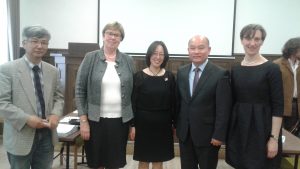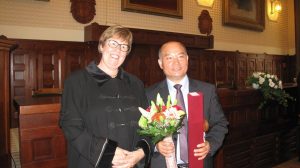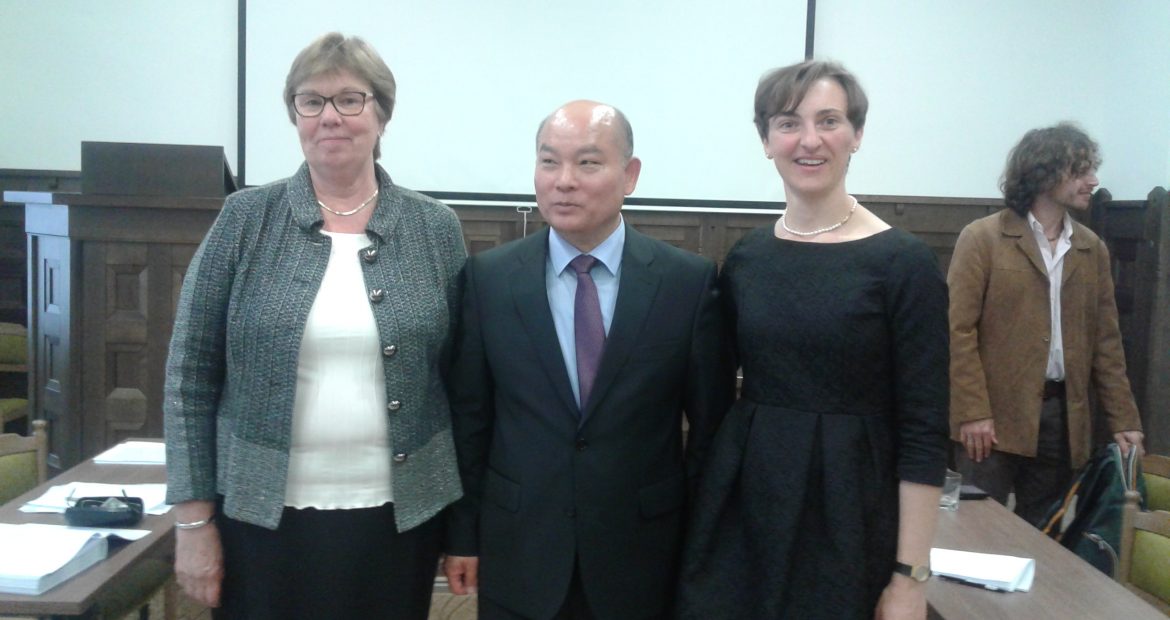It was a day not to forget easily! On May 15, Korean pastor Sung-kon Park defended his PhD thesis, a study focused on the missionary encounter between the Presbyterian Church of Korea and Protestant churches in Slovakia and the Czech Republic.
I was awed by the motivation for the Korean churches to start missionary work in central Europe after the fall of the Berlin Wall: to gain experience in a Post-communist setting when one day the door would open to go to North Korea.
The title of his dissertation is: “Missional Ecclesiology: Missionary Encounters between the Presbyterian Church of Korea (Tonghap) and Protestant Churches in the Czech Republic and Slovakia.“

Lee Jong-Sil, mission worker in Prague in Praag, Prof. Dr. Anne-Marie Kool, Sung-kon Park and his wife, Prof. Dr. Dorottya Nagy
Please read here the text of the Laudatio written and spoken myself.
Laudatio
for Sung-Kon Park, PhD
The laudatio was held by Prof. Dr. habil Anne-Marie Kool (Professor of Missiology at the Evangelical Theological Seminary, Osijek, Croatia, and head of the Osijek Institute for Mission Studies), as supervisor, also on behalf of Prof. Dr. Dorottya Nagy, Professor of Missiology at the Protestant Theological University in Amsterdam, as co-supervisor) at the inauguration ceremony as Doctor in Philosophy at the Karoli Gáspár University of the Reformed Church in Hungary, on July 1, 2017.
Dear Doctor,
Dear Colleagues,
Dear Guests,
Dr. Park’s cradle stood in South Korea, in 1966, the year that a book was published with the title: Wildfire, Church Growth in Korea. This title reflects the image many of us have of church life in South Korea. It motivated churches in Central and Eastern Europe to establish links with Korean Churches following the changes in 1989. This title is also closely related to the topic of the doctoral thesis, Dr. Park recently has successfully defended.
Dr. Park is married to Seok-Ran KIM and has two sons, 24 and 22.
For the last twenty years Dr. Park has given evidence of his great passion: studying theology, initially with a focus on the Old Testament, later turning to missiology.
He complete his Bachelor of Theology in 1996 at the Presbyterian University and Theological Seminary, in Seoul. Three years later, in 1999, he earned his Master of Divinity (M.Div.) in Theology with a thesis focusing on the Book of Ruth. In 2001, he gained a Master of Theology (Th.M.) in Old Testament Theology at the same institution. In this period, in 2000/2001, he worked as student assistant at the Old Testament Department in the Presbyterian University and Theological Seminary. From 2004-2009 Sung-Kon Park pursued a Doctor of Ministry (D Min) degree in Intercultural Studies. His thesis dealt with the Mission Strategy for the Reformed Christian Church in Slovakia.
In September 2011, he enrolled in the PhD program of the Theological Department of the Károli Gáspár University of the Reformed Church in Hungary. Today he will be awarded a PhD degree the successful defence of his dissertation titled Missional Ecclesiology: Missionary
Encounters between the Presbyterian Church of Korea (Tonghap) and Protestant Churches in the Czech Republic and Slovakia.
Dr. Park’s professional experience shows he is not an ivory tower scholar, but a pastor in the heart of hearts. From 1992 to 1999 the doctoral candidate was Part-time Minister (Evangelist) in the Jin Gwan Presbyterian Church in Gyungkido and in the Young Joo Presbyterian Church in Seoul. In this latter church, he served as Full-time Minister from 1999-2001, followed by his Ordination in 2001 as Pastor of the Presbyterian Church of Korea (PCK).
His life also shows that he “practices what he preaches” by living out the everyday realities of theology and mission, by blooming where he is planted.
Since 2002 he has been working as a missionary sent by the PCK, the first two years in Indonesia, and since 2004 in Slovakia, working with the Reformed Christian Church in Slovakia. His ministry in Slovakia focuses on three main areas: Pastoring of the Korean Reformed Church in Bratislava (since 2006), Co-worker of Central Europe Center for Mission Studies (CECMS) in Prague (since 2007) and Lecturer of Missiology at the Reformed Theological Faculty of the Selye János University in Komárno, Slovakia (since 2009).
His life as a missionary, together with his wife and his family has been marked by many challenges, living as a Korean Presbyterian missionary in the Hungarian speaking part of Slovakia, in the centre of an encounter between three different cultures.
Dr. Park, and Mrs. Park, you are to all of us an example of true sacrifice and commitment, showing the reality of mission in Christ’s way.
In his dissertation, Dr. Park follows the method of auto-ethnography, in which the analysis of these personal experiences play an important role.
We first met in 2008 at the quadrennial conference of the International Association for Mission Studies held in Balatonfüred. A few years later he expressed his desire to embark on the adventure to do a PhD. Dr. Dorottya Nagy, now Professor of Missiology at the Protestant Theological University in Amsterdam was willing to serve as co-supervisor.
This dissertation was not an easy birth. In the midst of his numerous responsibilities, it was not easy to carve out quality time for research. However, his determination and self-discipline to make the most of every day, often even using his nights, has allowed him to finish this dissertation, “with God’s help”, as he always emphasized.
The key word of the dissertation is “missionary encounters”: between churches that differ a great deal from each other: the Presbyterian Church of Korea (Tonghap) and Protestant Churches in the Czech Republic and Slovakia. The doctoral candidate is in a sense part of both worlds, and is a kind of “middle man” between two different contexts and two different churches. Thus, the research topic is closely related to Sung-Kon Park as a missionary of the Presbyterian Church of Korea and to his missionary work in Slovakia.
He explored how the Presbyterian Church of Korea’s (PCK, Tonghap denomination) understanding of missional ecclesiology translates into the context of Central and Eastern Europe (CEE), by analysing, examining and investigating the PCK’s missionary endeavour in the Czech Republic and Slovakia. It examined the complexity and dynamics of the PCK’s missionary encounter with Protestant churches of the Czech Republic and Slovakia and its effect on all agents involved.
A remarkable aspect of this study is the parallel between the socio-social situation in Slovakia after the fall of communism (1989) and the current tense situation around North Korea, where communism is still alive in optima forma. The motivation of the Korean churches to launch missionary work in Eastern Europe after the fall of the Berlin Wall was aimed at gaining experience of working in a Post-communist situation and thus considered as preparation for future work in North Korea.
Since the fall of communism, a process of reconciliation has taken place in the Eastern European Churches, while churches of the PCK in South Korea continue to pray for reunification and reconciliation with North Korea, even though this moment seems to be very far away.
Indeed, the day before Ds. Park’s public defence, North Korea launched the longest long-distance rocket with very dubious intentions. In response to questions about this dissertation, Dr. Park expressed his desire that he looks forward to reunification and reconciliation with the Korean people living in North Korea. ”
In this pioneering research, Dr. Park showed his ability to do thorough research, using all relevant primary and secondary sources, reflecting on it in an appropriate way, and his ability to take positions himself independently.
The public defence also made clear that the integrative quality of the dissertation is somewhat on the weaker side. Koreans are well known for their hospitality and to offer guests delicious meals. What is presented in this study gives the impression that more time would have been needed for the meal to be cooked well, for the various themes to better integrate
and the tastes to blend together more harmoniously. This is no wonder, because what you have accomplished in a relatively short time while being busy with work in church, academia and by hosting many Korean teams on short term mission trips to CEE is remarkable. Your study shows some other gaps. Little attention is paid to the imbedding of the missionary encounters in the wider Slovakian and Czech church context, and in the ecumenical context of South Korea.
Dr. Park, your dissertation is a significant study for Slovakia, the Czech Republic and for the PCK in South Korea. It gives valuable new insights in the missionary encounters between a Korean Presbyterian Church, with Protestant churches in Slovakia and the Czech Republic, and the role of missionaries as go-in-between, that spark off important lessons on the relation between church and mission, including issues of minority, ethnicity and Christian identity. Such missionary encounters reveal blind spots in each of the agents involved. This could in turn encourage reflection and conversations that are contextually sensitive and theologically motivated, and thus strengthen the churches’ witness in their own context and beyond. This reflection and these conversations have now just started.
Dr. Park, we need your expertise in our region, with your double academic and pastoral mindset. It is very important for the missionary encounter you have described, to be extended beyond the Protestant churches in Slovakia and the Czech Republic. Our theological conversations in this part of Europe do not yet reflect the richness of new insights and perspectives when “indigenous” theologians encounter theologians and missionaries from Asia, Africa and Latin America.
Allow us as Doctor Mutter to challenge you to affect the next generation in a credible way with your own autobio graphical theology and life. You will meet with significant difficulties as you try to break the numerous prejudices, but your ability to persevere and your trust in your Lord and Saviour will help you through.
graphical theology and life. You will meet with significant difficulties as you try to break the numerous prejudices, but your ability to persevere and your trust in your Lord and Saviour will help you through.
Dr. Park, a new phase starts now in your life. I congratulate your family and colleagues, especially your wife, wishing you all God’s blessing.
I have spoken.
Prof. Dr. Anne-Marie Kool
